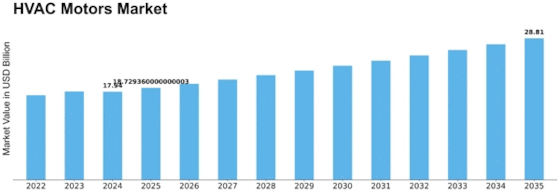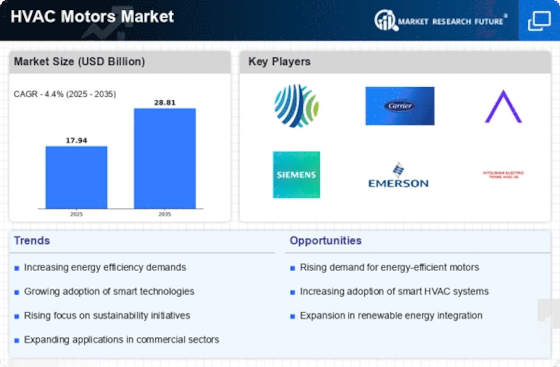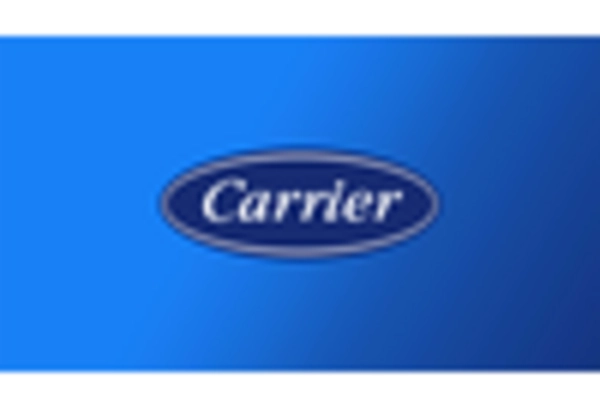Heating
Ventilation
Air Conditioning
Refrigeration
AC Motors
DC Motors
Universal Motors
Residential
Commercial
Industrial
Less than 1 HP
1-5 HP
5-10 HP
Above 10 HP
North America
Europe
South America
Asia Pacific
Middle East and Africa
North America Outlook (USD Billion, 2019-2032)
North America HVAC Motors Market by Application Type
Heating
Ventilation
Air Conditioning
Refrigeration
North America HVAC Motors Market by Type
AC Motors
DC Motors
Universal Motors
North America HVAC Motors Market by End Use Type
Residential
Commercial
Industrial
North America HVAC Motors Market by Power Rating Type
Less than 1 HP
1-5 HP
5-10 HP
Above 10 HP
North America HVAC Motors Market by Regional Type
US
Canada
US Outlook (USD Billion, 2019-2032)
US HVAC Motors Market by Application Type
Heating
Ventilation
Air Conditioning
Refrigeration
US HVAC Motors Market by Type
AC Motors
DC Motors
Universal Motors
US HVAC Motors Market by End Use Type
Residential
Commercial
Industrial
US HVAC Motors Market by Power Rating Type
Less than 1 HP
1-5 HP
5-10 HP
Above 10 HP
CANADA Outlook (USD Billion, 2019-2032)
CANADA HVAC Motors Market by Application Type
Heating
Ventilation
Air Conditioning
Refrigeration
CANADA HVAC Motors Market by Type
AC Motors
DC Motors
Universal Motors
CANADA HVAC Motors Market by End Use Type
Residential
Commercial
Industrial
CANADA HVAC Motors Market by Power Rating Type
Less than 1 HP
1-5 HP
5-10 HP
Above 10 HP
Europe Outlook (USD Billion, 2019-2032)
Europe HVAC Motors Market by Application Type
Heating
Ventilation
Air Conditioning
Refrigeration
Europe HVAC Motors Market by Type
AC Motors
DC Motors
Universal Motors
Europe HVAC Motors Market by End Use Type
Residential
Commercial
Industrial
Europe HVAC Motors Market by Power Rating Type
Less than 1 HP
1-5 HP
5-10 HP
Above 10 HP
Europe HVAC Motors Market by Regional Type
Germany
UK
France
Russia
Italy
Spain
Rest of Europe
GERMANY Outlook (USD Billion, 2019-2032)
GERMANY HVAC Motors Market by Application Type
Heating
Ventilation
Air Conditioning
Refrigeration
GERMANY HVAC Motors Market by Type
AC Motors
DC Motors
Universal Motors
GERMANY HVAC Motors Market by End Use Type
Residential
Commercial
Industrial
GERMANY HVAC Motors Market by Power Rating Type
Less than 1 HP
1-5 HP
5-10 HP
Above 10 HP
UK Outlook (USD Billion, 2019-2032)
UK HVAC Motors Market by Application Type
Heating
Ventilation
Air Conditioning
Refrigeration
UK HVAC Motors Market by Type
AC Motors
DC Motors
Universal Motors
UK HVAC Motors Market by End Use Type
Residential
Commercial
Industrial
UK HVAC Motors Market by Power Rating Type
Less than 1 HP
1-5 HP
5-10 HP
Above 10 HP
FRANCE Outlook (USD Billion, 2019-2032)
FRANCE HVAC Motors Market by Application Type
Heating
Ventilation
Air Conditioning
Refrigeration
FRANCE HVAC Motors Market by Type
AC Motors
DC Motors
Universal Motors
FRANCE HVAC Motors Market by End Use Type
Residential
Commercial
Industrial
FRANCE HVAC Motors Market by Power Rating Type
Less than 1 HP
1-5 HP
5-10 HP
Above 10 HP
RUSSIA Outlook (USD Billion, 2019-2032)
RUSSIA HVAC Motors Market by Application Type
Heating
Ventilation
Air Conditioning
Refrigeration
RUSSIA HVAC Motors Market by Type
AC Motors
DC Motors
Universal Motors
RUSSIA HVAC Motors Market by End Use Type
Residential
Commercial
Industrial
RUSSIA HVAC Motors Market by Power Rating Type
Less than 1 HP
1-5 HP
5-10 HP
Above 10 HP
ITALY Outlook (USD Billion, 2019-2032)
ITALY HVAC Motors Market by Application Type
Heating
Ventilation
Air Conditioning
Refrigeration
ITALY HVAC Motors Market by Type
AC Motors
DC Motors
Universal Motors
ITALY HVAC Motors Market by End Use Type
Residential
Commercial
Industrial
ITALY HVAC Motors Market by Power Rating Type
Less than 1 HP
1-5 HP
5-10 HP
Above 10 HP
SPAIN Outlook (USD Billion, 2019-2032)
SPAIN HVAC Motors Market by Application Type
Heating
Ventilation
Air Conditioning
Refrigeration
SPAIN HVAC Motors Market by Type
AC Motors
DC Motors
Universal Motors
SPAIN HVAC Motors Market by End Use Type
Residential
Commercial
Industrial
SPAIN HVAC Motors Market by Power Rating Type
Less than 1 HP
1-5 HP
5-10 HP
Above 10 HP
REST OF EUROPE Outlook (USD Billion, 2019-2032)
REST OF EUROPE HVAC Motors Market by Application Type
Heating
Ventilation
Air Conditioning
Refrigeration
REST OF EUROPE HVAC Motors Market by Type
AC Motors
DC Motors
Universal Motors
REST OF EUROPE HVAC Motors Market by End Use Type
Residential
Commercial
Industrial
REST OF EUROPE HVAC Motors Market by Power Rating Type
Less than 1 HP
1-5 HP
5-10 HP
Above 10 HP
APAC Outlook (USD Billion, 2019-2032)
APAC HVAC Motors Market by Application Type
Heating
Ventilation
Air Conditioning
Refrigeration
APAC HVAC Motors Market by Type
AC Motors
DC Motors
Universal Motors
APAC HVAC Motors Market by End Use Type
Residential
Commercial
Industrial
APAC HVAC Motors Market by Power Rating Type
Less than 1 HP
1-5 HP
5-10 HP
Above 10 HP
APAC HVAC Motors Market by Regional Type
China
India
Japan
South Korea
Malaysia
Thailand
Indonesia
Rest of APAC
CHINA Outlook (USD Billion, 2019-2032)
CHINA HVAC Motors Market by Application Type
Heating
Ventilation
Air Conditioning
Refrigeration
CHINA HVAC Motors Market by Type
AC Motors
DC Motors
Universal Motors
CHINA HVAC Motors Market by End Use Type
Residential
Commercial
Industrial
CHINA HVAC Motors Market by Power Rating Type
Less than 1 HP
1-5 HP
5-10 HP
Above 10 HP
INDIA Outlook (USD Billion, 2019-2032)
INDIA HVAC Motors Market by Application Type
Heating
Ventilation
Air Conditioning
Refrigeration
INDIA HVAC Motors Market by Type
AC Motors
DC Motors
Universal Motors
INDIA HVAC Motors Market by End Use Type
Residential
Commercial
Industrial
INDIA HVAC Motors Market by Power Rating Type
Less than 1 HP
1-5 HP
5-10 HP
Above 10 HP
JAPAN Outlook (USD Billion, 2019-2032)
JAPAN HVAC Motors Market by Application Type
Heating
Ventilation
Air Conditioning
Refrigeration
JAPAN HVAC Motors Market by Type
AC Motors
DC Motors
Universal Motors
JAPAN HVAC Motors Market by End Use Type
Residential
Commercial
Industrial
JAPAN HVAC Motors Market by Power Rating Type
Less than 1 HP
1-5 HP
5-10 HP
Above 10 HP
SOUTH KOREA Outlook (USD Billion, 2019-2032)
SOUTH KOREA HVAC Motors Market by Application Type
Heating
Ventilation
Air Conditioning
Refrigeration
SOUTH KOREA HVAC Motors Market by Type
AC Motors
DC Motors
Universal Motors
SOUTH KOREA HVAC Motors Market by End Use Type
Residential
Commercial
Industrial
SOUTH KOREA HVAC Motors Market by Power Rating Type
Less than 1 HP
1-5 HP
5-10 HP
Above 10 HP
MALAYSIA Outlook (USD Billion, 2019-2032)
MALAYSIA HVAC Motors Market by Application Type
Heating
Ventilation
Air Conditioning
Refrigeration
MALAYSIA HVAC Motors Market by Type
AC Motors
DC Motors
Universal Motors
MALAYSIA HVAC Motors Market by End Use Type
Residential
Commercial
Industrial
MALAYSIA HVAC Motors Market by Power Rating Type
Less than 1 HP
1-5 HP
5-10 HP
Above 10 HP
THAILAND Outlook (USD Billion, 2019-2032)
THAILAND HVAC Motors Market by Application Type
Heating
Ventilation
Air Conditioning
Refrigeration
THAILAND HVAC Motors Market by Type
AC Motors
DC Motors
Universal Motors
THAILAND HVAC Motors Market by End Use Type
Residential
Commercial
Industrial
THAILAND HVAC Motors Market by Power Rating Type
Less than 1 HP
1-5 HP
5-10 HP
Above 10 HP
INDONESIA Outlook (USD Billion, 2019-2032)
INDONESIA HVAC Motors Market by Application Type
Heating
Ventilation
Air Conditioning
Refrigeration
INDONESIA HVAC Motors Market by Type
AC Motors
DC Motors
Universal Motors
INDONESIA HVAC Motors Market by End Use Type
Residential
Commercial
Industrial
INDONESIA HVAC Motors Market by Power Rating Type
Less than 1 HP
1-5 HP
5-10 HP
Above 10 HP
REST OF APAC Outlook (USD Billion, 2019-2032)
REST OF APAC HVAC Motors Market by Application Type
Heating
Ventilation
Air Conditioning
Refrigeration
REST OF APAC HVAC Motors Market by Type
AC Motors
DC Motors
Universal Motors
REST OF APAC HVAC Motors Market by End Use Type
Residential
Commercial
Industrial
REST OF APAC HVAC Motors Market by Power Rating Type
Less than 1 HP
1-5 HP
5-10 HP
Above 10 HP
South America Outlook (USD Billion, 2019-2032)
South America HVAC Motors Market by Application Type
Heating
Ventilation
Air Conditioning
Refrigeration
South America HVAC Motors Market by Type
AC Motors
DC Motors
Universal Motors
South America HVAC Motors Market by End Use Type
Residential
Commercial
Industrial
South America HVAC Motors Market by Power Rating Type
Less than 1 HP
1-5 HP
5-10 HP
Above 10 HP
South America HVAC Motors Market by Regional Type
Brazil
Mexico
Argentina
Rest of South America
BRAZIL Outlook (USD Billion, 2019-2032)
BRAZIL HVAC Motors Market by Application Type
Heating
Ventilation
Air Conditioning
Refrigeration
BRAZIL HVAC Motors Market by Type
AC Motors
DC Motors
Universal Motors
BRAZIL HVAC Motors Market by End Use Type
Residential
Commercial
Industrial
BRAZIL HVAC Motors Market by Power Rating Type
Less than 1 HP
1-5 HP
5-10 HP
Above 10 HP
MEXICO Outlook (USD Billion, 2019-2032)
MEXICO HVAC Motors Market by Application Type
Heating
Ventilation
Air Conditioning
Refrigeration
MEXICO HVAC Motors Market by Type
AC Motors
DC Motors
Universal Motors
MEXICO HVAC Motors Market by End Use Type
Residential
Commercial
Industrial
MEXICO HVAC Motors Market by Power Rating Type
Less than 1 HP
1-5 HP
5-10 HP
Above 10 HP
ARGENTINA Outlook (USD Billion, 2019-2032)
ARGENTINA HVAC Motors Market by Application Type
Heating
Ventilation
Air Conditioning
Refrigeration
ARGENTINA HVAC Motors Market by Type
AC Motors
DC Motors
Universal Motors
ARGENTINA HVAC Motors Market by End Use Type
Residential
Commercial
Industrial
ARGENTINA HVAC Motors Market by Power Rating Type
Less than 1 HP
1-5 HP
5-10 HP
Above 10 HP
REST OF SOUTH AMERICA Outlook (USD Billion, 2019-2032)
REST OF SOUTH AMERICA HVAC Motors Market by Application Type
Heating
Ventilation
Air Conditioning
Refrigeration
REST OF SOUTH AMERICA HVAC Motors Market by Type
AC Motors
DC Motors
Universal Motors
REST OF SOUTH AMERICA HVAC Motors Market by End Use Type
Residential
Commercial
Industrial
REST OF SOUTH AMERICA HVAC Motors Market by Power Rating Type
Less than 1 HP
1-5 HP
5-10 HP
Above 10 HP
MEA Outlook (USD Billion, 2019-2032)
MEA HVAC Motors Market by Application Type
Heating
Ventilation
Air Conditioning
Refrigeration
MEA HVAC Motors Market by Type
AC Motors
DC Motors
Universal Motors
MEA HVAC Motors Market by End Use Type
Residential
Commercial
Industrial
MEA HVAC Motors Market by Power Rating Type
Less than 1 HP
1-5 HP
5-10 HP
Above 10 HP
MEA HVAC Motors Market by Regional Type
GCC Countries
South Africa
Rest of MEA
GCC COUNTRIES Outlook (USD Billion, 2019-2032)
GCC COUNTRIES HVAC Motors Market by Application Type
Heating
Ventilation
Air Conditioning
Refrigeration
GCC COUNTRIES HVAC Motors Market by Type
AC Motors
DC Motors
Universal Motors
GCC COUNTRIES HVAC Motors Market by End Use Type
Residential
Commercial
Industrial
GCC COUNTRIES HVAC Motors Market by Power Rating Type
Less than 1 HP
1-5 HP
5-10 HP
Above 10 HP
SOUTH AFRICA Outlook (USD Billion, 2019-2032)
SOUTH AFRICA HVAC Motors Market by Application Type
Heating
Ventilation
Air Conditioning
Refrigeration
SOUTH AFRICA HVAC Motors Market by Type
AC Motors
DC Motors
Universal Motors
SOUTH AFRICA HVAC Motors Market by End Use Type
Residential
Commercial
Industrial
SOUTH AFRICA HVAC Motors Market by Power Rating Type
Less than 1 HP
1-5 HP
5-10 HP
Above 10 HP
REST OF MEA Outlook (USD Billion, 2019-2032)
REST OF MEA HVAC Motors Market by Application Type
Heating
Ventilation
Air Conditioning
Refrigeration
REST OF MEA HVAC Motors Market by Type
AC Motors
DC Motors
Universal Motors
REST OF MEA HVAC Motors Market by End Use Type
Residential
Commercial
Industrial
REST OF MEA HVAC Motors Market by Power Rating Type
Less than 1 HP
1-5 HP
5-10 HP
Above 10 HP



















Leave a Comment